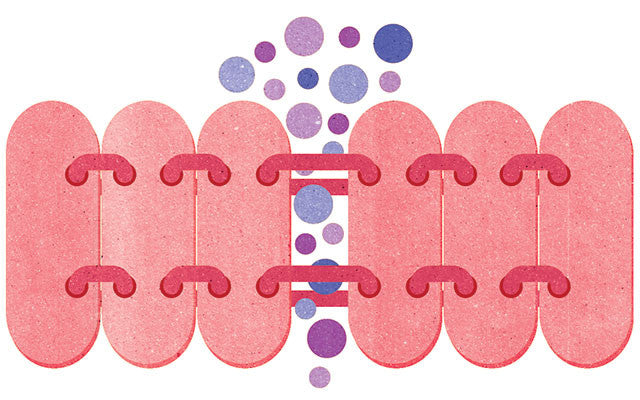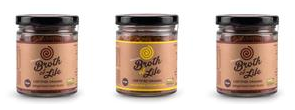
Your intestines are home to a great deal of your digestive system, nervous system, and immune system. Here’s how to keep them healthy.
Modern life is hard on your gut. Your entire digestive tract can be affected by stress, processed foods, alcohol, medications, and bacteria.
All that chronic irritation can lead to inflammation and, eventually, to a lot of little pinprick-style leaks in the very thin and delicate lining of your intestinal wall.
And even a tiny leak can cause surprisingly big problems. A healthy gut is very selective about what gets passed into your body. But a leaky gut can release undigested food particles, bacteria, and toxins into your bloodstream, leading to a potentially outsized immune response.
If the damage to the lining of your gut is bad enough that such substances regularly leak through, it can wreak havoc on your health.
And it’s a bit of a vicious cycle: “Our bodies can only fight so many fires at one time,” explains Liz Lipski, PhD, CCN, author of Digestive Wellness. “If someone is suffering from chronic stress, disease, or inflammation, the normal repair and maintenance of the gut gets deferred.”
What damages the gut? Lipski and other experts say the top culprits include nonsteroidal anti-inflammatory drugs (NSAIDs) like ibuprofen, as well as sugar, alcohol, processed foods, and any foods that trigger an allergic response. Other irritants include chronic stress, toxins, and microbiome imbalances.
Given how commonplace such irritants have become in our lives, it’s not surprising that intestinal-permeability problems are pervasive, says Jacob Teitelbaum, MD, coauthor of Real Cause, Real Cure: The 9 Root Causes of the Most Common Health Problems and How to Solve Them. “These days,” he asserts, “virtually everybody’s gut leaks to some degree.”
DAMAGE CONTROL
Leaky gut syndrome has been treated by the integrative and functional-medicine community for years. But now, more of mainstream medicine is acknowledging it, too.
So what’s changed? Our understanding of the microbiome, for one thing.
The discovery that human health and behavior are profoundly influenced by a huge population of microorganisms living predominantly in our guts shook up a lot of docs, says Leo Galland, MD, a conventionally trained internist in New York City who now serves as director of the Foundation for Integrative Medicine. “Western medicine’s acceptance of the leaky gut model has been nothing short of a sea change.”
Symptoms of a leaky gut vary. If the leakage is minor, symptoms will generally be confined to the gastrointestinal (GI) tract, explains Tom Sult, MD, a Minnesota-based physician and author of Just Be Well. Typical results? Bloating, gas, or cramps.
More significant leaks are more likely to produce bodywide symptoms, he says, including fatigue, joint pain, rashes, respiratory issues, asthma, and autoimmune responses — including psoriasis.
The good news, says Galland, is that the cells of the intestinal lining replace themselves every three to six days. This means that, given the proper support, your gut can repair itself quickly.
Here are the “five Rs” — remove, replace, reinoculate, repair, and rebalance — recommended by our panel of gut-health experts.
REMOVE
With leaky gut, the first step is to identify and remove the source of gut-lining irritation, rather than attempting to suppress its symptoms with drugs.
Start an elimination diet. Removing common irritants like sugar, dairy, gluten, soy, and the chemical additives found in many processed foods can provide surprisingly quick relief, says Galland, who notes that sugar alone is enough to cause gut problems for many. A properly conducted elimination diet can help you pinpoint which foods are causing trouble: Eliminate a food for two weeks, then reintroduce the food, and keep notes on its effects.
Begin a food journal. Write down what you eat and how it affects you. If you feel bloated, fatigued, or gassy, add that food to your elimination list. “Most likely,” says Lipski, “your gut is telling you what foods it is sensitive to. You just need to listen.”
Limit use of alcohol and NSAIDs. Alcohol taxes the liver and steals nutrients from the gut. NSAIDs inhibit the body’s production of prostaglandins, substances needed to rebuild the intestines’ lining. “If you use a full therapeutic dose of NSAIDs for two weeks, there is a 75 percent chance you will develop a leaky gut that doesn’t go away when you stop taking the drug,” says Galland. If you are dependent on NSAIDs for pain management, work to reduce your total load as much as possible, advises Sult.
Root out infections. Leaky gut can be instigated by any number of pathogenic microorganisms and parasites that thrive in the gut’s warm, mucosal environment. If food-level interventions aren’t helping, find a healthcare practitioner to run tests and treat you. Because “all the nutrients in the world won’t help you if you have a parasite,” says Lipski.
REPLACE
The second step is to give your body what it needs to rebuild the gut lining. Lipski likens the inside of the small intestine to a towel covered with millions of little loops (called villi), which in turn are covered with millions of little fibers (called microvilli). If the gut is leaky, those fibers get matted, hampering regrowth and the absorption of nutrients from food. It’s a vicious cycle, because the villi need those nutrients to revive.
Eat plenty of whole foods. The body needs the components in real, fresh food to repair damage and rebuild healthy new tissue. Whole foods are full of vitamins, minerals, and phytonutrients, plus enzymes the small intestine needs to heal.
Prioritize nonstarchy vegetables and lean proteins. And eat plenty of good, whole-food fats — they help strengthen cellular membranes.
As your body heals, it will get rid of toxins and byproducts through your large intestine. You’ll need lots of fiber to eliminate that toxic waste material as quickly and efficiently as possible.
The best high-fiber foods are colorful vegetables, berries, legumes, nuts, seeds, and whole-kernel grains. Aim for 30 grams of fiber a day. Lipski suggests supplementing with 1 to 2 tablespoons of psyllium seeds, flaxseeds, chia seeds, or oat bran. If you have gluten sensitivities or are doing an elimination diet, stick with flaxseeds (also a good source of omega-3s) or psyllium seeds, which you can sprinkle in smoothies, or on hot cereal or granola.
Many of our experts also suggest supplementing with a good multivitamin, since nutrient deficiencies commonly accompany leaky gut conditions, even in those eating a healthy, whole-food diet.
Take digestive enzymes. The villi and microvilli projections are covered with digestive enzymes that your body needs to break food into component parts: carbs, fats, and proteins. In a leaky gut, enzyme support is crucial to healing and rebuilding villi, says Sult.
Taking supplemental enzymes before you eat gives the GI tract a jump-start on digestion, making food easier to break down and nutrients easier to assimilate. Take one or two capsules with meals three times a day or as needed.
In most cases, the villi rebound over the course of a few weeks, but it may take well over a month, notes Sult. Only a small percentage of people will require lifetime enzymatic support
Supplement with glutamine. The most plentiful free amino acid in the body, glutamine supports immunity and digestion by fuelling the cells that line the small intestine. “Glutamine heals the intestinal lining more than any other nutrient,” says Lipski. She recommends taking 10 to 20 grams daily.
Get more omega-3 fatty acids. The gut uses them to calm inflammation and rebuild healthy cell walls. In animal studies, adding essential fatty acids improved the tight junctions between the gut lining’s cells and enabled the gut to fend off additional injury.
In addition to recommending several helpings of omega-3-rich foods, including coldwater fish, nuts, seeds, avocado, and purslane, Sult advises many of his patients to take a daily concentrated fish-oil supplement, preferably one with at least 3,000 milligrams of EPA and DHA. Look for a fresh, high-quality refrigerated oil that is tested for heavy metals and other impurities.
REINOCULATE
Once your body has patched up the leaks in the gut, you need to help it grow a healthy layer of good bacteria — flora that help protect the GI tract and assist with digestion. These beneficial bacteria strengthen your immune system, improve metabolism, help your body make vitamins, and aid in the absorption of minerals. The two most important groups are lactobacilli and bifidobacteria.
Add a probiotic. High-intensity probiotic support rejuvenates and replenishes a microbiome damaged by antibiotics or a poor diet. Sult recommends a high-potency probiotic of at least 50 billion active cultures twice daily. For added insurance, he says, choose one that is enteric-coated, meaning it will ferry the bacteria through the stomach’s acid and release them into the alkaline intestines.
Eat fermented foods. To get your good probiotic bugs to stick around, says Sult, you’ve got to eat daily servings of prebiotic- and probiotic-rich foods such as kefir, yogurt (dairy or nondairy), sauerkraut, tempeh, and kombucha.
Other perks of fermented foods include lowered inflammation, increased blood-sugar control, and improved antioxidant status. “The only way to make a robust, permanent impact on gut flora, short of a fecal transplant, is with dietary change,” he says.
REPAIR AND REBALANCE
Once you’ve got your gut on the road to wellness, it’s time to focus on lasting lifestyle changes. Sliding back into the habits that caused your leaky gut will only invite the return of health problems you want to avoid. Here are two key strategies for supporting ongoing gut health:
As you eat, chew thoroughly, paying attention to your food’s flavor and texture. Avoid multitasking or rushing while you eat. Take pauses and breaths between bites, allowing your digestive system to keep pace.
Calm your central nervous system. Under stress, the body’s nervous system kicks into fight-or-flight mode — the opposite of its rest-and-digest mode. Recalibrate by cultivating a calmer, more centered state. Consider a daily meditation or yoga practice. Or on a stressful day, swap heavy weightlifting for a tai-chi class. “When you change your thoughts,” says Sult, “you change your physiology.”





















